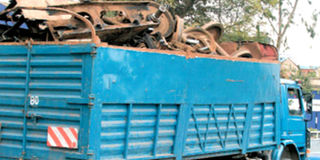Alarm over illicit exportation of scrap batteries to Tanzania

Battery manufacturers have expressed fears that they will soon run short of raw materials following increased exportation of scrap batteries to Tanzania.
Battery manufacturers have expressed fears that they will soon run short of raw materials following increased exportation of scrap batteries to Tanzania.
The manufacturers said there has been increased illicit trade of scrap batteries to Tanzania, a move that is now threatening their businesses locally.
Mr Peter Wafula from the Battery Manufacturers Association has urged the government to cooperate with Tanzania to curb the illegal trade of scrap batteries so that business locally can thrive.
“The situation is getting serious and if not controlled, local manufacturers will have to close or scale down operations due to lack of raw materials,” Mr Wafula said.
Scrap metal
Reports indicate that scrap metal in Tanzania is in high demand, a move that is now forcing local dealers to use illegal means to export the materials.
On Monday this week, authorities once again intercepted a truck ferrying scrap batteries to neighbouring Tanzania on Mombasa Road.
The truck, registration number KCG 317L, was detained at around 1.45 am along the Nairobi-Mombasa Road at Kimana area and detained at Loitokitok Police Station.
Loitoktok OCPD Charles Chepkonga, said that a multi-agency team is currently handling the matter.
“We have taken over the matter and we want to establish whether the arrested transporter has a licence from us which is a requirement under the law,” Joseph Kopejo, the Nema director in charge of Kajiado.
In May this year, the government issued strict regulations that require licensed scrap metal dealers to transport their cargo between 6.30 am and 6.30 pm.
With the new regulations in place, the government lifted a January 20, 2022 ban that President Uhuru Kenyatta imposed on scrap metal business following a surge in vandalism of critical national assets including power transformers.
The new rules impose a Sh10 million fine or a three-year jail term to anyone found operating without a license.
Repeat offenders are liable to a fine not exceeding Sh20 million or imprisonment for not more than five years. Export of scrap metal under the new rules remains restricted.
The multi-agency team comprises officers from the National Environment Management Authority (Nema) and the Kenyan Revenue Authority among others.
Last year, Nema Director-General Mamo Mamo said that the authority, in partnership with other relevant government agencies, had adopted an intelligence-based enforcement approach, where they gather intelligence before striking.
Last year, the KRA deputy commissioner in charge of the western region Pamela Ahago said despite the business being outlawed, some traders were still exporting scrap automotive batteries using the porous border points.
Scrap batteries
Two drivers were jailed last year for transporting scrap batteries to Tanzania and the trucks confiscated by the State as the law stipulates.
The two drivers were convicted and fined Sh300, 000 and their trucks forfeited to the state in line with the provisions of the Scrap Metal Act.
Kenya banned the export of scrap metals, which includes spent-lead-acid–batteries (SLABs), through the law enacted in 2015.
The East African region has two lead-acid battery manufacturers, namely Associated Battery Manufacturers and Uganda Batteries Limited who produce about 30 per cent of the East African market requirement.





